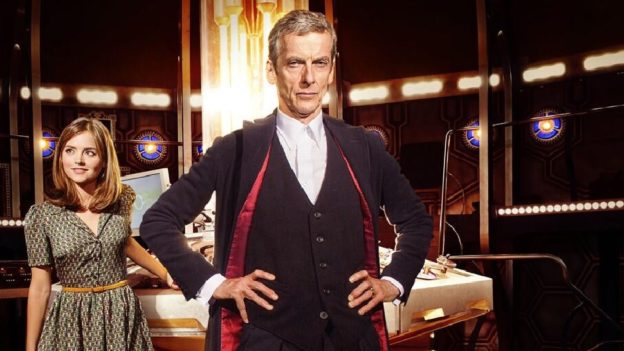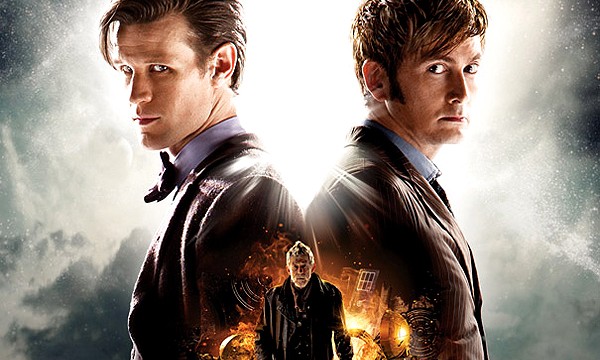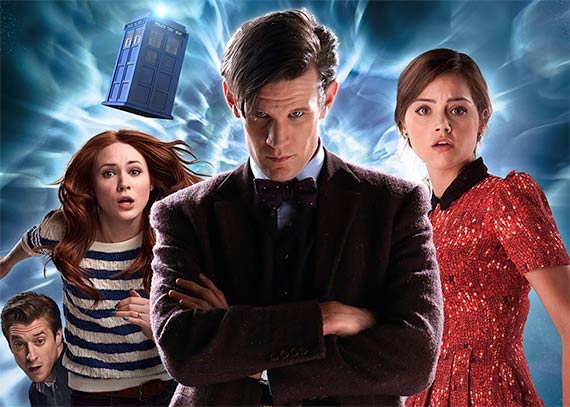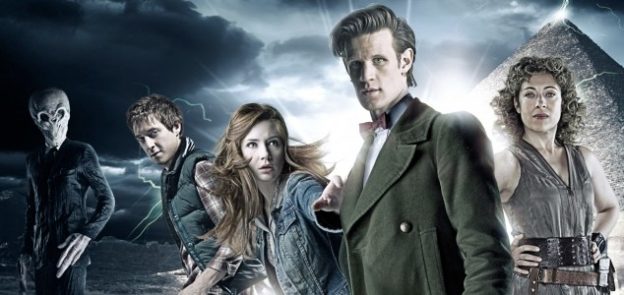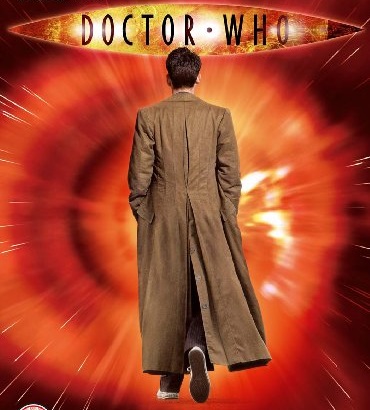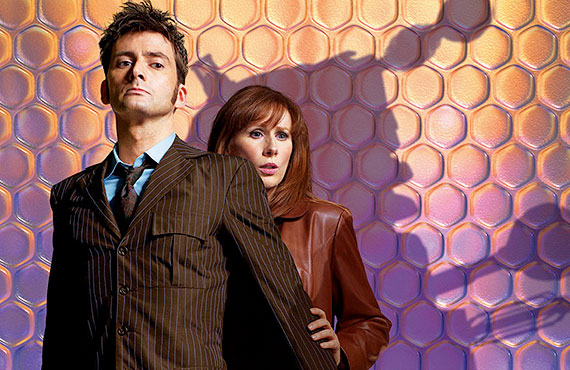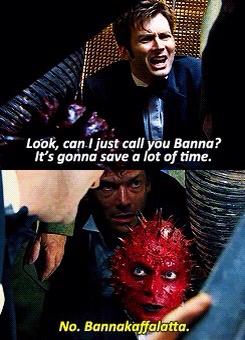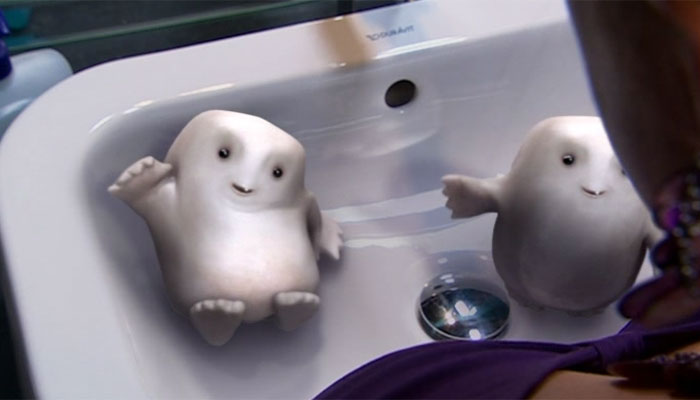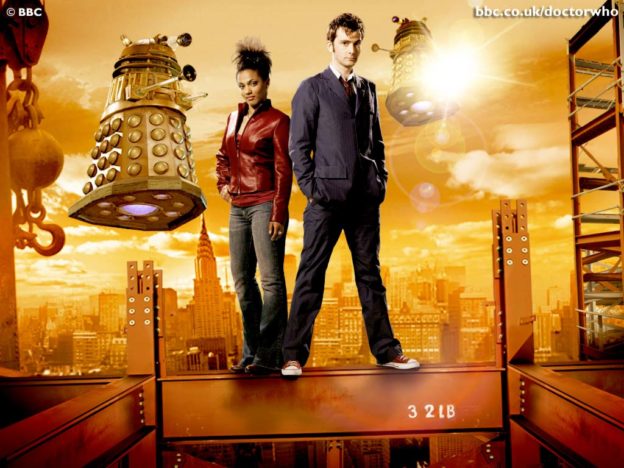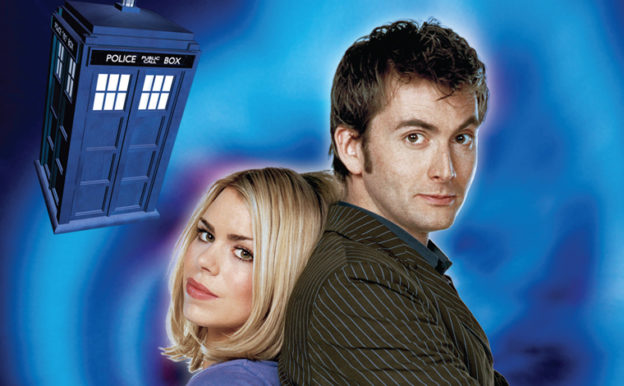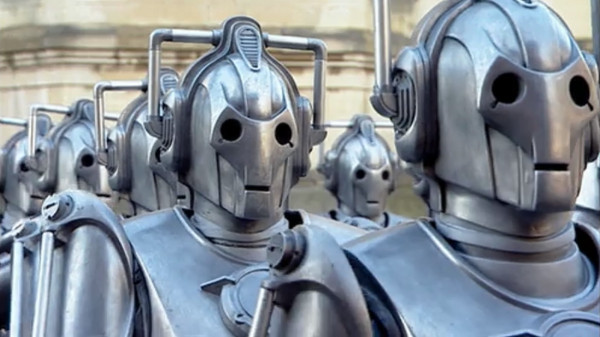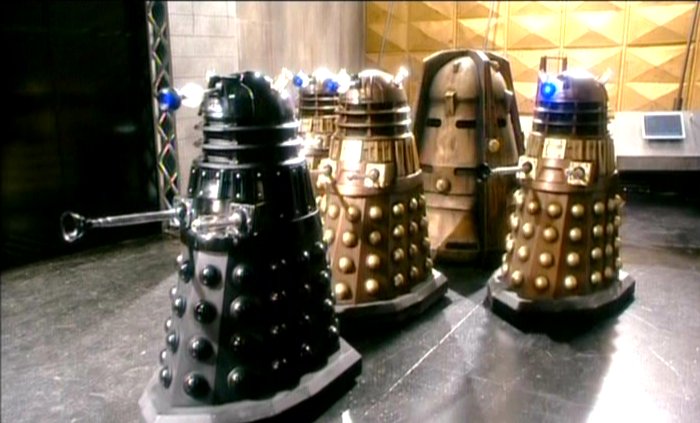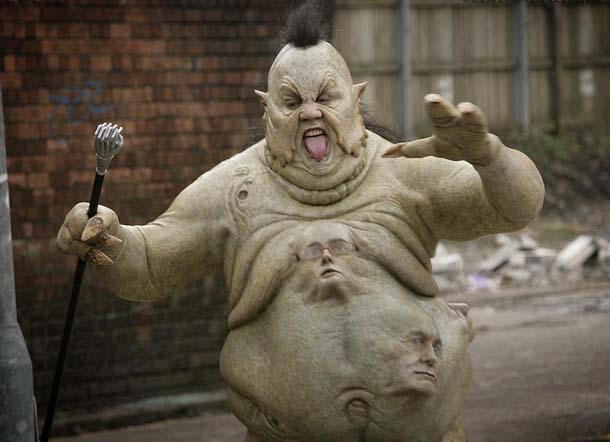…So how about that Thirteenth Doctor, huh? She’s fun. Looking forward to seeing where that’s going. So guess I need to adjust my opening…
A new Doctor has arrived. The first female Doctor. This has some people wondering if it’s time to try out this show I love so much.
Well, that’s what I’m here for. Because when you love a show as much as I love Doctor Who, you have opinions.
These are mine.
It’s Christmas!
No, no it’s not. That was The Time of The Doctor. Nine months later, it’s time for Peter Capaldi to get to work.
Series Eight: Twelve Arrives
I don’t know that I’ve ever seen a post-regeneration episode so… meta as Deep Breath, the debut episode for Peter Capaldi’s Twelfth Doctor. While The Doctor, Clara, and a returning (for the last time, unless Chris Chibnall chooses to bring them back) Paternoster Gang track sinister robots murdering people (and one dinosaur a freshly regenerated and confused Doctor accidentally brought to Victorian London) to harvest their body parts. But Clara’s distracted from all of that, because she’s not having the easiest time adjusting to The Doctor’s regeneration. She’s hoping there’s a way to change him back into young, dashing, Eleven.
It’s as though, for the most part, Clara is meant to represent all the new-Who fans (previously embodied by UNIT’s Doctor-fangirl scientist Osgood, introduced in the 50th anniversary and back in this series) who reacted poorly to an older actor playing The Doctor back when Capaldi was announced. Which was a little mean, Capaldi had been a Doctor Who fan his whole life and maybe we could have just been happy for him getting to actually be The Doctor.
And so a series of characters drill into Clara that this new face is The Doctor now and she needs to accept that. Madame Vastra rakes her over the coals for thinking he was young in the first place, Twelve pleads with her to just… see him, and we even had an unexpected return appearance by Matt Smith as Eleven, phoning Clara from Trenzalore, right before his regeneration. Told you the Tardis phone was off the hook for a reason.
It all adds up to the most work this show has done to sell the audience on The Doctor regenerating since Patrick Troughton took over. You know, the first time it happened. Deep Breath puts more work into selling the audience on a regeneration than the time they first had to explain what regeneration was.
In her defense, Clara pushes back hard against the notion that she was just doing all this because she had a crush on Eleven. In fact, one exchange between Twelve and Clara clarifies their previous relationship, and sets the stage for their new dynamic…
“I’m The Doctor. I’ve lived for over two thousand years, and not all of them were good. I’ve made many mistakes, and it’s about time that I did something about that. Clara, I’m not your boyfriend.”
“I never thought you were.”
“I never said it was your mistake.”
Yes… Eleven was falling in love with Clara. Yes, he thought it may have been mutual. Which explains why his response was so gung ho when she called him on Christmas saying “You’re my boyfriend,” and a touch disappointed when she explained she just wanted him to pretend to be her boyfriend for family dinner. I didn’t mention that bit last time because I felt this moment, when he sees what they are and were with new eyes, was the defining moment for The Doctor and Clara. He’s not her boyfriend and never was… but she remains important to him. Incredibly so, as I’ll explain in our next segment hey here it comes–
The Doctor
“Look at the eyebrows! These are attack eyebrows. You could take bottle tops off with these!”
I can’t speak for certain that the circumstances of a regeneration are meant to leave a mark on the new Doctor, but my English professors all taught me to ignore and disdain author intent so I look for it anyway. And Eleven regenerated after centuries of war against his worst enemies. My take is that it left a shell, but not nearly so much as being forced to watch generations of friends be born, age, and die. For the first three centuries on Trenzalore he bonded with everyone in the town of Christmas. By the end, as old age set in, he was mistaking people for a child who had no doubt died over 500 years ago. Maybe this got too hard. Eleven hated endings, and being stuck on Trenzalore exposed him to so, so many. Is it any wonder that Twelve is slower to embrace new people?
After two consecutive bright, cheerful, everyone’s-friend Doctors, Moffat felt it was time to try another direction (that was still white and male). Twelve has the hard, angry edge of Nine without the facade of friendly humour. While he fiercely defends humanity, he doesn’t adore them the way Ten did or form quick attachments like Eleven. In fact the phrase “pudding brain” gets thrown around a lot. If you impress him, he’ll warm up to you (witness the engineer in Mummy on the Orient Express, who turns down an invitation to stay on the Tardis). Otherwise, he tends to forget which one you were as soon as you’re out of his sight.
And one more thing about the new Doctor I attribute to his former self…
“I’m Scottish. I am… Scottish. I can complain about things, I can really complain about things now!”
I sometimes wonder if David Tennant is annoyed that he’s the only contemporary Doctor that didn’t get to use his natural accent. Eccleston got to be northern, Whittaker isn’t being asked to turn down the Yorkshire, Smith is naturally as close to Standard British as they get, and Capaldi’s Scottish. I neither know nor care about the behind-the-scenes reason for this. I choose to think of it as The Doctor’s final tribute to Amy Pond.
But don’t let the crusty shell make you think he’s without compassion. He might not have romantic intentions for Clara, but she still means the world to him. He might not think she’s pretty (which is funny because blind people can tell Jenna Coleman’s beautiful), and is confused by her every effort to look moreso, but there’s almost nothing he wouldn’t do for her. Almost. There are only certain ways he’s willing to tear the universe in half for Clara.
How much does he need Clara? Look at the smile on his face when she decides to keep travelling with him at the end of Mummy on the Orient Express. I think that’s the most he’d smiled since regenerating. Part of this is his love for her, which like himself has only changed form, not diminished (she’s the first face this face saw, after all, that may still be a factor), and part of it is that The Doctor is no longer certain he’s a good man. Having a Dalek he names Rusty see beauty in his hatred of Daleks doesn’t help with this. But if Clara can believe in him, maybe he can too.
I get that.
As to Clara…
The Companion
Clara, more than any companion since… ever?… does her best to balance a regular Earth life with Tardis adventures. In series seven, she’d get dropped off after every adventure. In series eight…
Okay I’ll admit it. Maybe “Clara gets a boyfriend” isn’t, like, the most progressive way to express the “Normal life/Tardis life” struggle. It did put a human face on the struggle in a way that “Will Amy be around for bridesmaid duties” and “Should Rory take a full-time nursing job” never did. (Or could, since they only had one episode to make their cases.) And I maintain, love and romance are a key part of human existence… or so I recall… so why should we get all horked off every time Green Arrow or Supergirl wants to find someone special? Why shouldn’t The Doctor’s companion be allowed to find some companionship?
Thankfully the words “Danny says we can’t travel together” never come close to forming in her mouth, because she’s starting to grow as a character and that would have killed it dead. But while juggling Tardis adventures with trying to court an ex-soldier and fellow teacher named Danny Pink has its challenges, the real issue is The Doctor’s colder attitude. When he knows he can’t save someone, he is… unsettlingly practical about it. We see this in both Into the Dalek and Mummy on the Orient Express, where he views an unstoppable death as a way to gain an advantage or learn something that maybe, maybe, can save the next one, and he is really blunt about it. The days of frequent claims of “I’m sorry, I’m so sorry” are over, replaced with “You’re going to die, make it count.”
And she doesn’t love that.
She loves the travel. She sees wonders, as she puts it, and they save people. But she’s not sure she can deal with this new, callous attitude… until she sees him throw himself on a sort of mummy-shaped grenade for someone she’d thought he’d let die. To his credit, The Doctor doesn’t let himself off the hook easily, saying that he thought there was a chance he could save her, but not a guarantee. That sometimes there’s nothing but hard choices.
She also succeeds at playing The Doctor during Flatline. Something The Doctor doesn’t find comforting, which he lets slip when she claims she was The Doctor and she was good.
“You were an exceptional Doctor, Clara. Goodness had nothing to do with it.”
Maybe Clara needs her normal, Earth life as much as The Doctor needs Clara…
The Promised Land
“You know the key strategic weakness of the human race? The dead outnumber the living.”
The robots of Deep Breath and the robots of Robot of Sherwood are looking for the Promised Land. A weird thing for two sets of robots to both be doing. What’s even stranger, though, is one of them finds it. In a way.
Throughout the year, when people die (as they tend to on this show) they find themselves in a facility, claiming to be the Afterlife, run by a woman named Missy and her assitant Seb. When Missy first arrives, she refers to The Doctor as her boyfriend, even claiming to have adopted his accent out of love.
Missy is collecting the dead.
That’s probably not a good thing.
It’s a bit more “Bad Wolfy” than other recent season arcs (Impossible Girl notwithstanding, which only pretended to make progress before the finale), but at least when we get our regular reminders of what’s happening, it’s through a delightfully twisted performance by Michelle Gomez, which we’ll discuss below.
The Supporting Cast
Danny Pink. Oh, he was a divisive character. But he works for me because of the conflict between him and The Doctor. The Doctor dislikes him immediately, because he’s a soldier. Twelve does not care for soldiers. Maybe something to do with those centuries of war Eleven just lived through. He refuses to accept that Danny teaches math (no, the British, I will not call it “maths”), calling him PE on the assumption that soldiers can only teach phys ed.
Danny dislikes The Doctor for two reasons. First, he represents an entire side to his girlfriend’s life that he never knew about, and it turns out he’s a little touchy about dishonesty. Second, he sees through The Doctor’s bluster about soldiers. He immediately identifies The Doctor as not just a soldier, but an officer. The man issuing the orders that get soldiers killed.
Which is… not an unfair assessment. As Davros pointed out to Ten back in Journey’s End, a lot of good people have died helping him vanquish foes. We don’t know much about what he did during the Time War, save for hints from that speech from Rings of Akhaten (I really should have spent more time on that), only that both the Daleks and Time Lords were scared of him. But he was likely a general on Trenzalore, leading the Silence into battle for centuries upon centuries. So it’s fair to say that Danny’s assessment, and his habit of treating The Doctor like an officer out of scorn, gets under The Doctor’s skin for a reason.
He’s also haunted by the one bad day that drove him out of the British army. But that would be telling.
One thing that separates Danny Pink from Mickey Smith or Rory Williams is that he has no interest in Tardis life. He doesn’t want to see the universe. He wants to be the best teacher he can be, focus on what’s right in front of him. But in In the Forest of the Night, he puts a charming spin on it, so as not to be an anchor like Jackie Tyler.
Oh, there’s also Courtney Woods, one of Clara’s trickier students, a “disruptive influence” at Coalhill, who ends up getting involved in a couple of Tardis adventures. She’s… well, she’s a bit of an improvement on Angie from last year, but she disappears after Kill the Moon and you’ll never miss her.
The Monsters
The Big Bad: Missy. Michelle Gomez (previously of Green Wing, soon to be of The Chilling Adventures of Sabrina) is sensational as Missy, playful and cheerful on the surface, but the cruelty behind the smile is pretty clear from her earliest appearances. She smiles like a shark, sizing up prey, even when she’s being nice. She’s fun to watch in action even when she’s doing awful things we wish like Hell she wasn’t. And a lot of the fandom figured out the hidden clue in her name, guessed who Missy really was.
[spoiler title=’Who’s Missy?’ style=’default’ collapse_link=’true’]”You know who I am,” she cooed to The Doctor. “I’m Missy.” “Who’s Missy?” he responded. “Please, try to keep up,” she sighed. “Short for Mistress. Well… couldn’t very well keep calling myself ‘The Master,’ now could I?” Nearly five years and two Doctors later, The Master’s back. And she’s got plans for her old frienemy.[/spoiler]
Missy’s not out to rule the world. She’s out to prove to The Doctor… okay this is sounding a little bit Gotham but don’t hold that against them… she’s out to prove to The Doctor that they aren’t really that different. Because once he accepts that… they can be friends again. That’s all she really wants. Her friend back.
Sometimes big schemes with simple motivations are the best villain plots.
Also, she presents the answer to a question that’s been around since The Bells of St. John. Who gave Clara the number for the Tardis? Who made sure The Doctor and Clara met back up in Deep Breath? Missy did. She wants these two together. Might… might not be the best sign.
This Year in Daleks: They wasted no time giving lifelong Who fan Capaldi a go-round with the Daleks. In Into the Dalek, he attempts to see if a Dalek (that he names Rusty, I’m probably telling you that for a reason) can become good by shrinking down, entering its shell, and playing with its mind. The results are… not what he hoped, and a little disturbing for him personally.
Classic Monsters Revived: We’ve run low on classic monsters worth reviving, so we’re down to revived post-reboot monsters for the moment. Specifically, the clockwork body-harvesting robots from The Girl in the Fireplace. The Doctor is constantly commenting on how familiar they are just to drive that home. In fairness, for him, that was 1000 years and two faces ago.
The Good: I do quite like the Boneless from Flatline. They work.
In the tradition of werewolves, vampires, and witches that all turned out to be aliens, The Doctor takes on a mummy that’s… basically an alien, let’s just say alien.
I’ll talk about Listen below.
Keeley Hawes does well as the villain of Time Heist.
Also expect another classic villain or two towards the end. Which? …Spoilers.
The Bad: Look, if you’re going to say that the Sheriff of Nottingham is in league with some larger threat, maybe try harder than another big clunking robot? Or maybe it’s silly to try to out-villain the Sheriff of Nottingham, I don’t know.
The Ugly: The Skovox Blitzer from The Caretaker might not be their best work.
High Point
Listen is quite the ride. The Doctor, after maybe spending a little too long knocking around on his own, theorizes that if there are perfect predators, and perfect defense from predators, then maybe there’s something out there that’s perfect at hiding. Maybe nobody’s ever really alone. And maybe everyone who’s ever had a dream about something under the bed wasn’t dreaming. Determined to find this thing he’s convinced is out there, he tries to take Clara into her past… but accidentally ends up in the childhood of her new gentleman friend Danny Pink, and also gets a glimpse at what might be their future.
And ultimately, they end up in a familiar shed, in a time and place Clara never thought she’d see.
Clara and The Doctor each get a good speech about fear, we watch the flirtations and calamities of her first date with Danny, The Doctor learns that not every book with pictures has Waldo (Wally to the British) hiding in it… and the most interesting part?
We never know if The Doctor’s right or not.
They certainly seem to bump into… something, or somethings, along the way, but… we don’t know for sure that it was ever what The Doctor thinks. Maybe they narrowly cheated death twice. Maybe it was all in his head. We never know.
An uncertain ending is good now and then. As The Doctor sometimes shows us, there’s novelty and even excitement in not knowing something.
Low Point
The point of Kill the Moon is to bring Twelve and Clara to a point where she’s ready to cut ties with him. It doesn’t last, since in Mummy on the Orient Express they go for one last hurrah that leaves Clara deciding she can’t give up Tardis life after all, but they clearly wanted Clara’s feelings about Twelve’s colder attitude to reach a breaking point, where she’s ready to leave the Tardis, not because Danny wants her to, but because she can’t handle Twelve’s seeming indifference anymore. Which, credit where due, was the better choice… having it be Clara’s decision independent of Danny’s preferences was important.
The problem is, the way they got there was pretty dumb.
The premise, in which the moon is an egg, and it hatching might be a disaster, is right out of one of the weirder Bob the Angry Flower strips, one I would link to except apparently creator Steven Notley is embarrassed enough of that particular strip that he pulled it from his archive.
To review, the premise of Kill the Moon was ultimately too silly for weekly gag strip Bob the Angry Flower. Although in this case the monster in the moon egg doesn’t run a private detective firm but I’m not convinced that makes it better.
And Clara’s breaking point comes when The Doctor says “That’s a humdinger of a dilemma for humanity, welp, good luck” and straight up leaves until Clara, Courtney, and the woman who came to blow up the moon make a choice about what to do, protect humanity from unknown consequence or allow an innocent creature to be born.
Wow it is also really uncomfortably anti-choice, when you get down to it.
The Doctor could have had a mental break, having found himself in another Pompeii/Waters of Mars situation, with a twist of Beast Below. Where he either risks humanity or kills a space whale and can’t bear to have his own hand on the switch again, but instead it’s this whole “Humanity’s choice, I’m not human, so my name’s Paul and that’s ‘tween y’all” thing that Clara is understandably livid about.
It’s a whole lot of just sloppy dumb. They did a big moment badly. Fortunately, Mummy on the Orient Express walks it back easily enough.
Highlights?
Several people I knew fell off the Doctor Who bus during series eight. I always encourage them that series eight was Capaldi’s rough patch, and his later years were much better. This is true, yet still a disservice, because there’s a lot to love in series eight.
Into the Dalek is a great way for The Doctor and a Dalek to get into each other’s heads.
Say what you will about Robot of Sherwood but I still think The Doctor and Robin Hood’s banter is fun.
I do enjoy heist movies. So of course I’m a little fond of Time Heist. Clara’s fun date-night suit certainly doesn’t hurt.
The Caretaker, in which The Doctor infiltrates Coalhill, is worth it for the awkward meeting of The Doctor and Danny Pink, and also Clara confronting The Doctor as to his subterfuge…
“You recognized me, then.”
“You changed your coat.”
“And you saw right through that.”
And yet for all of that, Mummy on the Orient Express and Flatline are the double-header (but not two-parter) where the show really finds its footing. And Flatline has the first really great Doctor speech from Capaldi.
Dark Water/Death in Heaven is the first proper two-part episode since Rebel Flesh/Almost People, and it is a barn burner. Missy’s gambit is revealed as she takes centre stage, and man it’s worth the wait.
Skippables?
I don’t think there’s anything on par with Aliens of London/World War III or Fear Her in here, but there are some notable weak spots.
In the Forest of the Night is a slightly important moment for Clara and Danny, but otherwise it’s an entirely disposable outing. Sadly Kill the Moon is more important, because its a turning point for Clara, but you know, Mummy on the Orient Express can catch you up.
And if Robot of Sherwood isn’t doing it for you, skip to Listen. That’s the handy thing about series eight… the weakest episodes are always followed by the strongest.
Parting Thoughts
Notable Guest Stars:
- Missy’s assistant Seb is played by Peter Capaldi’s old The Thick of It and In the Loop costar Chris Addison, who was also Headmaster David Blood on Skins. Shame they don’t have a scene together.
- Michael Smiley, who I know as Tires from Spaced but you may know from the White Bear episode of Black Mirror turns up in Into the Dalek.
- People who watched Da Vinci’s Demons might recognize the guy playing Robin Hood. Not me, though.
- Huh. I am… I am running out. Faster than normal. Well… Rigsy from Flatline is going to be Cyborg on Doom Patrol, that’s a thing. And the dick running his community service was the Broker in Guardians of the Galaxy.
- Siwan Morris, who plays a mother in In the Forest of the Night, was also on Skins as Angie the psych teacher. That one’s obscure even for me but it was a thin year for guest stars.
A key way to judge the quality of Twelfth Doctor episodes… the longer Capaldi’s hair gets, the better the show is. It’s pretty short at the top of the year, but it’s growing out by the end. Not the lavish mane he’ll have by series ten but he’s working on it.
This will also be the first of two times The Doctor’s regeneration is referred to as a “new haircut.” And both times are followed by a suggestion that he get his roots done.
The Doctor describes his new outfit (a simple suit, no tie, red-lined jacket) thusly: “I was going for minimalist but I think I landed on ‘magician.'”
Twelve’s Tardis is basically the same as Eleven’s post-Pond Tardis, save for two things… 1) they’ve accentuated the depth of it, either adding or calling further attention to the multiple levels. It certainly feels more cavernous. 2) He’s added some bookshelves and many, many chalkboards. Twelve does like scribbling equations on a chalkboard.
While trying to con The Doctor, Clara claims never to have seen lava. The Doctor looks very serious before saying “It’s rubbish.” Probably it’s because he’s figured out what she’s doing, but I’d like to think all that business at Pompeii, that we’ll learn helped inspire this face, played a role.
In Death in Heaven, Clara bluffs the [REDACTED], claiming to be The Doctor. The opening credits back her play, putting Jenna Coleman’s name first and replacing Capaldi’s eyes with hers. Neat touch.
Stay through the credits of the finale. The Doctor’s in a low spot, but he’s about to get help from an improbable visitor.
Doctor Quote of the Year: There’s a lot of “I’ll do a clever thing,” or “A thing will happen,” since Twelve doesn’t always know how to solve things but is well aware of his slightly random process. But I’m giving it to a one-off quote that made me love the new Doctor/Clara relationship…
“Do you think that I care for you so little that betraying me would make a difference?”
Historical Guest Star of the Year: The closest we get is Robin Hood, whose status as “historical figure” is so questionable that even The Doctor doesn’t buy he exists. And so we bid farewell to this feature.
Saddest Moment: Depending on who you’re fondest of, it’s either…
“I’m already dead. At least you’re here this time.”
Or…
“I’m proud of you, sister. But did I mention… bananas! Pop.”
Next time… the Year of Multi-parters, starting with the best two-parter since Impossible Astronaut/Day of the Moon.
Image: BBC

